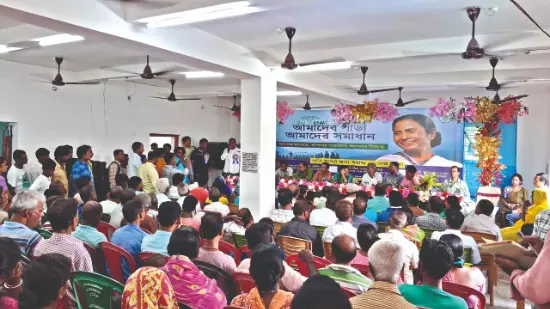‘APAS’ reaches 1.7 cr people through more than 23K camps across Bengal

Kolkata: Chief Minister Mamata Banerjee’s flagship initiative, ‘Amader Para, Amader Samadhan’ (APAS), has set a new benchmark by consistently delivering swift solutions to citizens visiting the camps with a wide range of issues.
So far, APAS has reached over 1.7 crore people through more than 23,000 camps organised across Bengal. One of the latest cases was reported from Kolkata as a woman’s long-pending issue was resolved within just five minutes at a camp held at Keshab Academy in Ward 26 of the Kolkata Municipal Corporation (KMC), underscoring the campaign’s focus on swift and accessible grievance redressal.
The ruling Trinamool Congress on Wednesday claimed that the Bengal government’s “Amader Para, Amader Samadhan” initiative proved its effectiveness once again. The woman beneficiary, while sharing her experience, noted that her issue, which had been pending for months, was solved within minutes at the camp, underlining the effectiveness of the initiative in bridging the gap between people and governance.
State Minister Shashi Panja, who attended the camp said: “We are at Keshab Academy where the APAS camp is being held with six booths.” Panja interacted with citizens, heard their complaints, and assured them of the best possible resolutions.
APAS was introduced as a flagship scheme at the beginning of August in order to expand participatory governance in the development of the grassroots infrastructure of the state.
The state government will be holding camps for public interactions, including meetings, booth-level discussions, till November 3, excluding Sundays and all public holidays, as well as the festival holidays.
The state government has already issued guidelines for works that can be taken up under ‘Amader Para Amader Samadhan’ which include construction or renovation of underground drains to address waterlogging , sewage , to ensure basic access to safe drinking water, street lighting, community toilets, upgrading ICDS centres, primary schools, revival and protection of traditional waterbodies for ecological and community benefit, garbage management, enhancing shared civic spaces for community meetings, minor renovations of market, basic transit related infrastructure to improve last mile connectivity, affordable community wellness infrastructure, road repair etc.



